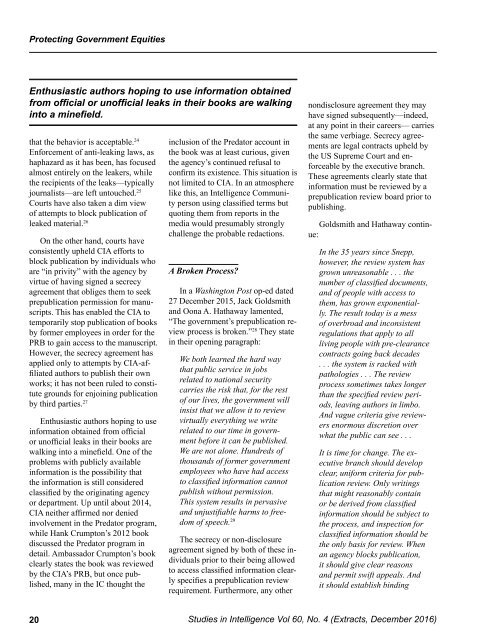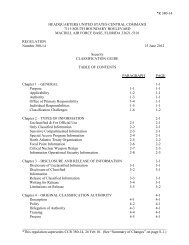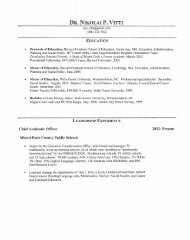extracts-studies-dec-2016
extracts-studies-dec-2016
extracts-studies-dec-2016
You also want an ePaper? Increase the reach of your titles
YUMPU automatically turns print PDFs into web optimized ePapers that Google loves.
<br />
Protecting Government Equities<br />
Enthusiastic authors hoping to use information obtained<br />
from official or unofficial leaks in their books are walking<br />
into a minefield.<br />
that the behavior is acceptable. 24<br />
Enforcement of anti-leaking laws, as<br />
haphazard as it has been, has focused<br />
almost entirely on the leakers, while<br />
the recipients of the leaks—typically<br />
journalists—are left untouched. 25<br />
Courts have also taken a dim view<br />
of attempts to block publication of<br />
leaked material. 26<br />
On the other hand, courts have<br />
consistently upheld CIA efforts to<br />
block publication by individuals who<br />
are “in privity” with the agency by<br />
virtue of having signed a secrecy<br />
agreement that obliges them to seek<br />
prepublication permission for manuscripts.<br />
This has enabled the CIA to<br />
temporarily stop publication of books<br />
by former employees in order for the<br />
PRB to gain access to the manuscript.<br />
However, the secrecy agreement has<br />
applied only to attempts by CIA-affiliated<br />
authors to publish their own<br />
works; it has not been ruled to constitute<br />
grounds for enjoining publication<br />
by third parties. 27<br />
Enthusiastic authors hoping to use<br />
information obtained from official<br />
or unofficial leaks in their books are<br />
walking into a minefield. One of the<br />
problems with publicly available<br />
information is the possibility that<br />
the information is still considered<br />
classified by the originating agency<br />
or department. Up until about 2014,<br />
CIA neither affirmed nor denied<br />
involvement in the Predator program,<br />
while Hank Crumpton’s 2012 book<br />
discussed the Predator program in<br />
detail. Ambassador Crumpton’s book<br />
clearly states the book was reviewed<br />
by the CIA’s PRB, but once published,<br />
many in the IC thought the<br />
inclusion of the Predator account in<br />
the book was at least curious, given<br />
the agency’s continued refusal to<br />
confirm its existence. This situation is<br />
not limited to CIA. In an atmosphere<br />
like this, an Intelligence Community<br />
person using classified terms but<br />
quoting them from reports in the<br />
media would presumably strongly<br />
challenge the probable redactions.<br />
A Broken Process?<br />
In a Washington Post op-ed dated<br />
27 December 2015, Jack Goldsmith<br />
and Oona A. Hathaway lamented,<br />
“The government’s prepublication review<br />
process is broken.” 28 They state<br />
in their opening paragraph:<br />
We both learned the hard way<br />
that public service in jobs<br />
related to national security<br />
carries the risk that, for the rest<br />
of our lives, the government will<br />
insist that we allow it to review<br />
virtually everything we write<br />
related to our time in government<br />
before it can be published.<br />
We are not alone. Hundreds of<br />
thousands of former government<br />
employees who have had access<br />
to classified information cannot<br />
publish without permission.<br />
This system results in pervasive<br />
and unjustifiable harms to freedom<br />
of speech. 29<br />
The secrecy or non-disclosure<br />
agreement signed by both of these individuals<br />
prior to their being allowed<br />
to access classified information clearly<br />
specifies a prepublication review<br />
requirement. Furthermore, any other<br />
nondisclosure agreement they may<br />
have signed subsequently—indeed,<br />
at any point in their careers— carries<br />
the same verbiage. Secrecy agreements<br />
are legal contracts upheld by<br />
the US Supreme Court and enforceable<br />
by the executive branch.<br />
These agreements clearly state that<br />
information must be reviewed by a<br />
prepublication review board prior to<br />
publishing.<br />
Goldsmith and Hathaway continue:<br />
In the 35 years since Snepp,<br />
however, the review system has<br />
grown unreasonable . . . the<br />
number of classified documents,<br />
and of people with access to<br />
them, has grown exponentially.<br />
The result today is a mess<br />
of overbroad and inconsistent<br />
regulations that apply to all<br />
living people with pre-clearance<br />
contracts going back <strong>dec</strong>ades<br />
. . . the system is racked with<br />
pathologies . . . The review<br />
process sometimes takes longer<br />
than the specified review periods,<br />
leaving authors in limbo.<br />
And vague criteria give reviewers<br />
enormous discretion over<br />
what the public can see . . .<br />
It is time for change. The executive<br />
branch should develop<br />
clear, uniform criteria for publication<br />
review. Only writings<br />
that might reasonably contain<br />
or be derived from classified<br />
information should be subject to<br />
the process, and inspection for<br />
classified information should be<br />
the only basis for review. When<br />
an agency blocks publication,<br />
it should give clear reasons<br />
and permit swift appeals. And<br />
it should establish binding<br />
20 <br />
Studies in Intelligence Vol 60, No. 4 (Extracts, December <strong>2016</strong>)




